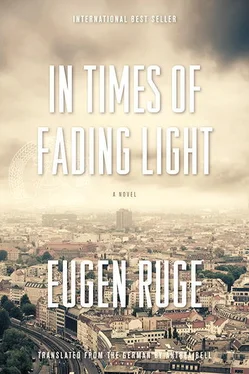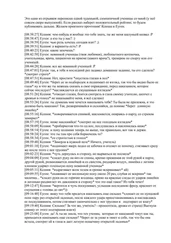“And how about Alexander? Don’t tell me Alexander isn’t feeling well either!”
“Mutti, I’m sorry, but…” Kurt began. However, Charlotte cut him short.
“What on earth are you thinking of, children? What am I supposed to tell Wilhelm? This is his ninetieth birthday!”
“Listen, would you, Mutti…”
“Yes, sorry,” said Charlotte. “Sorry… but I’m going out of my mind with all this. I can’t take much more!”
She groaned, and assumed her tragic expression.
“And Jühn isn’t coming either, imagine that! Sending a deputy—would you believe it? And Wilhelm is ninety today! He’s getting the Order of Merit of the Fatherland, in gold! But Jühn is sending a deputy!… Where are your flowers?”
“Oh, shit,” said Kurt. “I forgot them. Left them at home.”
“Well, never mind,” said Charlotte. “Pick up some of the others. There’s plenty out there.”
Kurt glanced at the cloakroom alcove, where countless bouquets were already languishing in the dim light, while his mother’s voice reached him as if from afar…
“…and please, Kurt, if you’re going in to see him now, not a word about any, well, events. You know what I mean: Hungary, Prague… and nothing about the Soviet Union.”
“And nothing about Poland,” said Kurt.
“Exactly,” said Charlotte.
“And nothing about the universe, and nothing about the moon,” said Kurt.
“Kurt, I do beg you, he’s no longer…” Charlotte rolled her eyes with a wealth of meaning. “He’s gone downhill recently.”
“I’ve gone downhill recently myself,” said Kurt.
He decided against the flowers.
When he entered the living room, Wilhelm was sitting in his arm-chair as usual, he looked the same as usual, and he was acting the same way, too. For years it had been his habit to receive birthday wishes sitting down, which in itself, thought Kurt, was ungracious to his guests, and when Wilhelm fired a question at him in his usual imperious manner as soon as he was in the room, he once again felt like telling the truth.
“Alexander is sick!”
Charlotte had intervened, getting her word in first. Wilhelm nodded, and beckoned Nadyeshda Ivanovna over to him. She gave him a jar of pickled gherkins that she had preserved herself, and Wilhelm, who lost no opportunity of showing off his knowledge of Russian, ventured on garosh, garosh! by way of response. He probably meant to say kharascho (meaning good), but he couldn’t manage even that. The fact was that Wilhelm knew no Russian, had never known any Russian. For although he liked to talk about his “Moscow years,” those Moscow years had never existed. It was true that he had gone to Moscow in 1936, in the company of Kurt and Werner (both of them had then stayed there “for reasons of safety”), in order, as Kurt suspected, to be trained in secret service work by Red Army Intelligence. However, his stay had lasted not years, but weeks at the most. Moreover, the strictly secret training center was somewhere well outside Moscow, so that in reality Wilhelm had seen the city little more than three times in his life. Garosh, garosh!
So that everyone else would know what was going on, Wilhelm now summoned Mählich over, had him open the jar of gherkins, and—ate one. He did even that in his inimitably ostentatious manner; the casual way in which he let the pickle drip its liquid back into the jar, the way he bit into it, the way he rolled the bitten pickle back and forth between his fingers and examined it, while uninhibitedly smacking his lips, all suggested that he was the ultimate authority on assessing the quality of a gherkin.
“ Garosh,” said Wilhelm once again, and now he finally allowed Kurt to wish him a happy birthday. But when Kurt offered him his hand, overcoming his reluctance to touch Wilhelm’s fingers, wet from the pickle, Wilhelm simply waved him away: Take those vegetables to the graveyard!
Vegetables to the graveyard? Kurt was surprised after all: had the old man really gone so far downhill, as Charlotte put it?
Then he turned to the rest of the company. In the past some very interesting people came to Wilhelm’s birthday party on occasion: Frank Janko, once the youngest divisional commander of the International Brigades, Karl Irrwig, who had at least tried to usher in a German form of socialism, in opposition to Ulbricht. Or there had been Stine Spier, the Brechtian actress, whom Charlotte and Wilhelm knew from the time of their exile in Mexico. But Janko’s name was not mentioned in this house after he was sent to prison six years ago for alleged “machinations” of some kind; after a while Karl Irrwig, who had certainly been excluded from the Politburo but had not entirely fallen out of favor, simply stopped coming here; Stine Spier, who always told amusing but politically disreputable stories about the theater, had finally been shown the door by Charlotte two or three years ago, if with a great show of courtesy, and so gradually all the guests who were in any way interesting had disappeared, until only this bunch was left, the company assembled here.
Mählich, of course, Wilhelm’s greatest admirer (a nice guy really, but he suffered from a tragically ponderous mind); Mählich’s wife, a former police officer (blond, and formerly so pretty that, had she not been hopelessly prudish, she would definitely have qualified for his, Kurt’s, collection of scalps); also the neighbors from opposite, a couple like two tubby barrels, Kurt had forgotten their names, as he did every year. The husband had once been janitor in Sasha’s school, and now ran small errands for Charlotte and Wilhelm; Kurt knew nothing about the wife except that she was said to have an artificial anus (artificial anus, what an odd idea). Then there was the community police officer, Comrade Krüger, whom Kurt never saw except from a distance as he rode past on his bike; there was Bunke, of course, high blood pressure, colonel in the Stasi, who always greeted Kurt effusively, asking after Irina, as if they were all close friends, God only knew how that had come about (they’d asked Bunke to tea only once, to discuss the two fir trees in his garden that cast their shade on Nadyeshda Ivanovna’s cucumber bed). Harry Zenk had also turned up: for a change an intelligent man, even a crafty character (although stupid enough to let himself be appointed head of the so-called Neuendorf Academy); and finally there was Gertrud Stiller, who always blushed when they met here once a year. Long ago, Charlotte had tried to palm the woman off on him, and the really shameful aspect of the business was that Kurt had actually considered the possibility, if not, maybe, entirely seriously—it was one of Kurt’s most closely guarded secrets, so secret that he hardly even remembered it himself; and, well, he didn’t know the rest of them at all—assorted saleswomen, Party veterans, and—oh, good God, what did he look like?
“Had a shtroke,” said Till, his voice blurred.
Tillbert Wendt, who had been in the Berlin-Britz Communist League of Youth with him: one year his junior. Kurt tried not to look too horrified. “And aside from that?”
Stupid question.
“Ashide from that I’m okay,” said Till.
“Well, we’re still alive, that’s what matters,” said Kurt, clapping him on the shoulder, although he felt sure he’d kill himself if something like that happened to him.
In the past he had never touched rich buttercream cake. But since he’d had the operation to remove two-thirds of his stomach, he could eat even rich buttercream cake with impunity. He had coffee as well, picking up one of the ancient, badly scratched rigid plastic cups brought out every year to supplement the “good china,” never quite enough of it to go around, that was inherited from the Nazi master of the house. In fact, Charlotte and Wilhelm had taken over everything along with the house (or to be precise, everything that was left after the Soviet officers who had been quartered here at first moved on). All they had thrown out was the cutlery with the tiny swastika engraved after the owner’s initials, with the result that guests in this house ate their cake off Nazi plates—but with spoons made by nationalized industry.
Читать дальше












